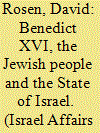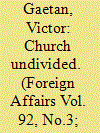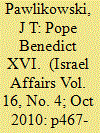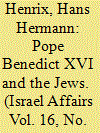| Srl | Item |
| 1 |
ID:
100688


|
|
|
|
|
| Publication |
2010.
|
| Summary/Abstract |
Benedict XVI has had to contend with invidious comparisons to his predecessor from the outset of his pontificate and this has been reflected in Jewish attitudes towards him as well. At the same time a selective loss of memory has occurred in relation to Pope John Paul II. By examining the documents and initiatives of Cardinal Ratzinger, as well as Pope Benedict XVI, this article shows that the idea that Benedict XVI is lacking commitment to the Catholic-Jewish relationship could not be further from the truth.
|
|
|
|
|
|
|
|
|
|
|
|
|
|
|
|
| 2 |
ID:
119666


|
|
|
|
|
| Publication |
2013.
|
| Summary/Abstract |
Pope Benedict XVI made reaching out to other faiths and promoting Christian unity hallmarks of his tenure. Pope Francis will continue this work, not only because he has a history of facilitating religious dialogue, but also because global Catholicism requires it.
|
|
|
|
|
|
|
|
|
|
|
|
|
|
|
|
| 3 |
ID:
100686


|
|
|
|
|
| Publication |
2010.
|
| Summary/Abstract |
Nostra Aetate, Vatican II's declaration on the Church's relationship with other religions, initiated a new stage in Catholic-Jewish relations. This relationship has been one marked by dialogue and the search for common ground. This has been continued by Pope Benedict. This same Pope has suggested that the documents of Vatican II can be interpreted through a hermeneutic of renewal in continuity or a hermeneutic of rupture. In this essay Nostra Aetate is examined through these two hermeneutics, and suggests that dialogue has become detached from evangelization. Pope Benedict's call for a Court of the Gentiles, borrowing from Judaism and the Temple, is examined and offered as useful for a new stage in Catholic-Jewish relations. The Court of the Gentiles provides us with new channels of dialogue and places the person of Jesus at the centre, as attempted by Rabbi Jacob Neusner. Finally, the mariological dimension of Nostra Aetate and Pope Benedict's writings is presented as an essential aspect of Catholic-Jewish dialogue which has been neglected.
|
|
|
|
|
|
|
|
|
|
|
|
|
|
|
|
| 4 |
ID:
100675


|
|
|
|
|
| Publication |
2010.
|
| Summary/Abstract |
Pope Benedict XVI came to the papacy with a very limited track record in terms of Catholic-Jewish relations generally speaking and virtually no public perspective on political issues related to the ongoing Israeli-Palestinian conflict. Since assuming the papacy he has addressed the Middle East political conflict only on a few occasions save for his trip to the region where he spoke to the question at length throughout his visit to Jordan, Israel and the Palestinian Authority. He was somewhat cautious in his remarks while highlighting several key issues. Pope Benedict affirmed several times during his visit that Christian-Muslim reconciliation was a strongly desired goal on the part of the Vatican. But he also gave his strong endorsement to territorial sovereignty for Israel alongside a Palestinian state. He even implied a direct connection between biblical Israel and the modern state. On numerous occasions he encouraged the local Christian community to stand fast in its faith and not leave the region. For Pope Benedict the continuation of a vibrant Christian community in the Middle East is of the highest priority. The future position of the Pope and the Vatican will no doubt be affected by the reception accorded to the KAIROS Palestine document, the results of the ongoing negotiations between the Holy See and the Israeli government over a host of specific issues such as taxation, clergy permits, etc., the development of a serious peace plan by US President Barack Obama and the conclusions of the Synod on the Middle East in October 2010.
|
|
|
|
|
|
|
|
|
|
|
|
|
|
|
|
| 5 |
ID:
100681


|
|
|
|
|
| Publication |
2010.
|
| Summary/Abstract |
The article deals with the question of whether the view that Benedict's relationship with the Jews needs to be regarded with suspicion is justified. Ratzinger's respective theology is scrutinized. Special attention is given to the contested Good Friday prayer for Jews as well as to the attempt at re-integrating the priests of the Pius X priest community. It cannot be denied that there is suspicion and ambiguity. In Benedict's view the fact that Israel is the foundation of Christian faith has been overshadowed. This firm belief has been expressed in Benedict's book on Jesus of Nazareth, during his visit to Israel in May 2009, and also during his address to the Jewish community in Rome in January 2010. The latter event is of particular importance. Benedict's address of 17 January 2010 can be seen as a central hermeneutical point of reference to understand Benedict's relationship with Judaism and the Jews. It is in the light of this point of reference that moments of suspicion can be counteracted. This does not mean, however, that Catholic-Jewish relations have been without irritations and tensions. But there is space for a constructive way of dealing with these frictions.
|
|
|
|
|
|
|
|
|
|
|
|
|
|
|
|